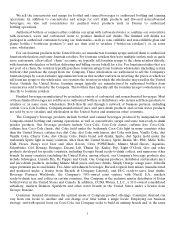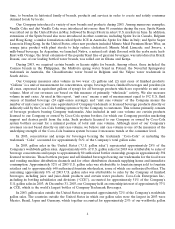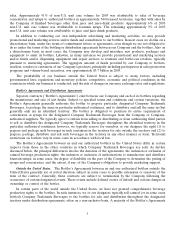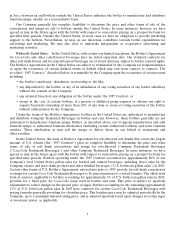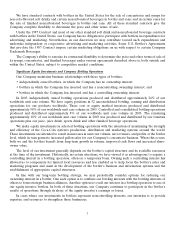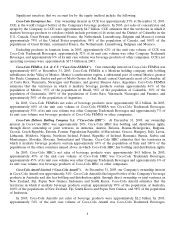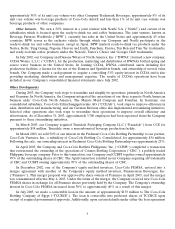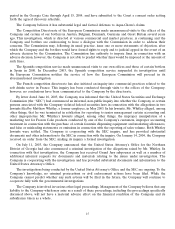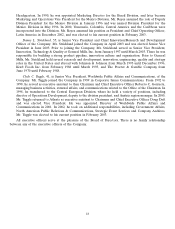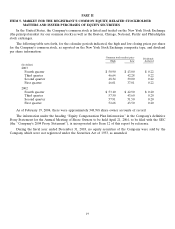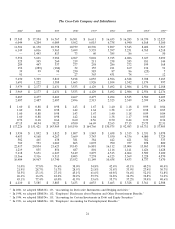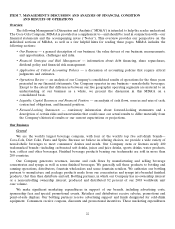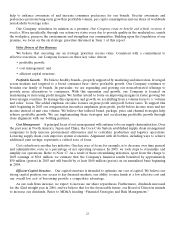Coca Cola 2003 Annual Report Download - page 16
Download and view the complete annual report
Please find page 16 of the 2003 Coca Cola annual report below. You can navigate through the pages in the report by either clicking on the pages listed below, or by using the keyword search tool below to find specific information within the annual report.ITEM 2. PROPERTIES
Our worldwide headquarters is located on a 35-acre office complex in Atlanta, Georgia. The complex
includes the approximately 621,000 square foot headquarters building, the approximately 870,000 square foot
Coca-Cola North America building and the approximately 264,000 square foot Coca-Cola Plaza building. The
complex also includes several other buildings, including the technical and engineering facilities, learning center
and reception center. Our Company leases approximately 250,000 square feet of office space at 10 Glenlake
Parkway, Atlanta, Georgia, which we currently sublease to third parties. In addition, we lease approximately
174,000 square feet of office space at Northridge Business Park, Dunwoody, Georgia. The North America
operating segment owns and occupies an office building located in Houston, Texas, that contains approximately
330,000 square feet. The Company has facilities for administrative operations, manufacturing, processing,
packaging, packing, storage and warehousing throughout the United States.
As of December 31, 2003, our Company owned and operated 30 principal beverage concentrate and/or
syrup manufacturing plants located throughout the world. In addition, we own or hold a majority interest in 36
operations with 92 principal beverage bottling and canning plants located outside the United States. Fourteen of
these plants are leased by us to one of our equity investees. CCDA owns four production facilities and leases one
production facility. All five of these facilities are located in the United States.
The North America segment operates ten noncarbonated beverage production facilities located throughout
the United States and Canada. It also utilizes a system of contract packers to produce and/or distribute certain
products where appropriate. The Company also owns a facility that manufactures juice concentrates for food
service use.
Our Company owns or leases additional real estate, including a Company-owned office and retail building
at 711 Fifth Avenue in New York, New York and approximately 315,000 square feet of Company-owned office
and technical space in Brussels, Belgium. Additional owned or leased real estate located throughout the world is
used by the Company as office space, for bottling, warehouse or retail operations or, in the case of some owned
property, is leased to others.
Management believes that the Company’s facilities for the production of its products are suitable and
adequate, that they are being appropriately utilized in line with past experience and that they have sufficient
production capacity for their present intended purposes. The extent of utilization of such facilities varies based
upon the seasonal demand for product. It is not possible to measure with any degree of certainty or uniformity
the productive capacity and extent of utilization of these facilities. However, management believes that
additional production can be obtained at the existing facilities by the addition of personnel and capital
equipment and, in some facilities, the addition of shifts of personnel or expansion of such facilities. We
continuously review our anticipated requirements for facilities and, on the basis of that review, may from time to
time acquire additional facilities and/or dispose of existing facilities.
ITEM 3. LEGAL PROCEEDINGS
On October 27, 2000, a class action lawsuit (Carpenter’s Health & Welfare Fund of Philadelphia & Vicinity v.
The Coca-Cola Company, et al.) was filed in the United States District Court for the Northern District of
Georgia alleging that the Company, M. Douglas Ivester, Jack L. Stahl and James E. Chestnut violated antifraud
provisions of the federal securities laws by making misrepresentations or material omissions relating to the
Company’s financial condition and prospects in late 1999 and early 2000. A second, largely identical lawsuit
(Gaetan LaValla v. The Coca-Cola Company, et al.) was filed in the same court on November 9, 2000. The
Complaints allege that the Company and the individual named officers: (1) forced certain Coca-Cola system
bottlers to accept ‘‘excessive, unwanted and unneeded’’ sales of concentrate during the third and fourth quarters
of 1999, thus creating a misleading sense of improvement in our Company’s performance in those quarters;
(2) failed to write down the value of impaired assets in Russia, Japan and elsewhere on a timely basis, again
resulting in the presentation of misleading interim financial results in the third and fourth quarters of 1999; and
13


